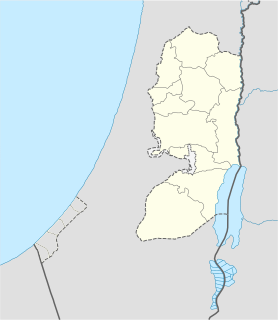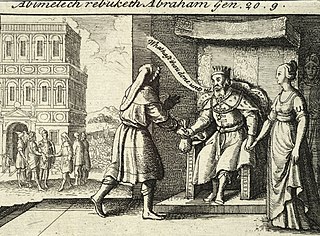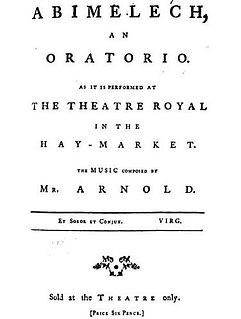
Abraham is the common patriarch of Christianity, Islam, Judaism, and other religions. In Judaism, he is the founding father of the covenant of the pieces, the special relationship between the Jewish people and God; in Christianity, he is the prototype of all believers, Jewish or Gentile; and in Islam he is seen as a link in the chain of prophets that begins with Adam and culminates in Muhammad.

The Philistines were an ancient people who lived on the south coast of Canaan between the 12th century BC and 604 BC when they were exiled to Mesopotamia by King Nebuchadnezzar II. They are known for their biblical conflict with the Israelites. The primary source of information about the Philistines is the Hebrew Bible, but they are first attested to in reliefs at the Temple of Ramses III at Medinet Habu, where they are called Peleset, accepted as cognate with Hebrew Peleshet; the parallel Assyrian term is Palastu, Pilišti, or Pilistu.

Bethel is a toponym often used in the Hebrew Bible. At first it was a place where Jacob dreamt of seeing angels and God, which he therefore named Bethel, "House of God". The name is further used for a border city located between the territory of the Israelite tribe of Benjamin and that of the tribe of Ephraim, which first belonged to the Benjaminites and was later conquered by the Ephraimites.
Achish (אָכִישׁ) is a name used in the Hebrew Bible for two Philistine rulers of Gath. It is perhaps only a general title of royalty, applicable to the Philistine kings. The two kings of Gath, which is identified by most scholars as Tell es-Safi, are:

Samson and Delilah, Op. 47, is a grand opera in three acts and four scenes by Camille Saint-Saëns to a French libretto by Ferdinand Lemaire. It was first performed in Weimar at the Grossherzogliches Theater on 2 December 1877 in a German translation.

Sarah or Sara, originally Sarai, is a matriarch in the Hebrew Bible, who was the wife of Abraham and the mother of Isaac. She was also Abraham's sister or his half–sister.

Shechem, also spelled Sichem, was a Canaanite city mentioned in the Amarna letters, and is mentioned in the Hebrew Bible as an Israelite city of the tribe of Manasseh and the first capital of the Kingdom of Israel. Traditionally associated with Nablus, it is now identified with the nearby site of Tell Balata in Balata al-Balad in the West Bank.
According to the Bible, Tola was one of the Judges of Israel. His career is summarised in Judges 10:1-2. He judged Israel for 23 years after Abimelech died. He lived at Shamir in Mount Ephraim, where he was also buried.
Jotham was the youngest of Gideon's seventy sons. He escaped when the rest were put to death by the order of his half-brother Abimelech.

Samson is a three-act oratorio by George Frideric Handel, considered one of his finest dramatic works. It is usually performed as an oratorio in concert form, but on occasions has also been staged as an opera. The well-known arias "Let the bright Seraphim" and "Total eclipse" are often performed separately in concert.
Gerar was a Philistine town and district in what is today south central Israel, mentioned in the Book of Genesis of the Hebrew Bible.
The patriarchal age is the era of the three biblical patriarchs, Abraham, Isaac and Jacob, according to the narratives of Genesis 12–50. It is preceded in the Bible by the primeval history and followed by The Exodus.
Shammah is a name mentioned several times in the Hebrew Bible.
There are three wife-sister narratives in Genesis, part of the Torah, all of which are strikingly similar. The narratives occur in Genesis 12, 20 and 26. At the core of each is the story of a Biblical Patriarch, who has come to be in the land of a powerful foreign overlord who misidentifies the Patriarch's wife as the Patriarch's sister, and consequently attempts to wed her himself. The overlord later finds out his error. Two of the three stories are similar in many other details, including the ruler's name, Abimelech.
Phicol, also spelled Phichol (KJV) or Phikol, was a Philistine military leader.
The Avim, Avvim or Avvites of Philistia in the Old Testament were a people dwelling in Hazerim, or "the villages" or "encampments", on the south-west corner of the sea-coast. Their name is first used in Deuteronomy 2:23 in a description of the conquests that had taken place in the Land of Israel during the Israelite sojourn in Egypt. The passage relates that they were conquered by the Caphtorites who usurped their land.

Zebul is a character in the Hebrew Bible, appearing in Judges 9. He is one of Abimelech's officers, and the governor of the city of Shechem. Zebul played an important role in the rebellion and defeat of Gaal, secretly sending messengers to Abimelech warning him of the situation.
This page is based on this
Wikipedia article Text is available under the
CC BY-SA 4.0 license; additional terms may apply.
Images, videos and audio are available under their respective licenses.










